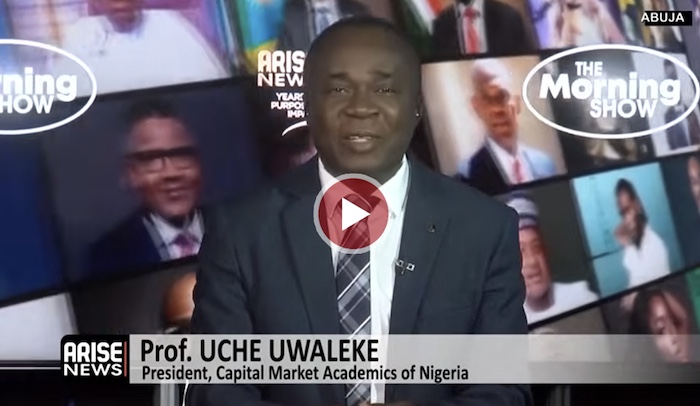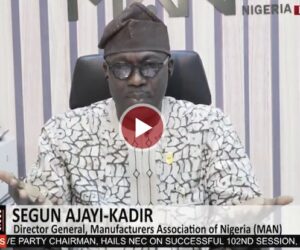
President of the Capital Market Academics of Nigeria, Professor Uche Uwaleke, has called for a higher share of the Federation Account to go to subnationals, while insisting that such allocations must be ring-fenced and tied to specific projects to avoid misuse.
Prof. Uwaleke in an interview with ARISE News on Thursday,explained saying, “I think the subnationals should get more, but it’s important to also point out that the Federal Government doesn’t get 52.68%, as you mentioned. The FG actually gets 48.5%. What enters the CRF, the Consolidated Revenue Fund, is 48.5%. The 4.18% on top of that comprises special funds—1% for the FCT, 1.68% for development of natural resources, 0.5% stabilisation fund, and 1% ecology. The bulk of that is meant to be held in trust on behalf of the subnationals in particular.”
He argued that the Federal Government’s share was still large when compared with other federations, saying: “India has a similar structure with 28 states, eight union territories and several local governments. Forty-one percent of their allocation is devolved to subnationals. In our own case, it’s just 26.72% that goes to subnationals. I think they deserve more, particularly now that they are being saddled with responsibilities like infrastructure, electricity and railways.”
The don, however, stressed that any increase must not go directly into state treasuries without restrictions. “If we are going to increase the share of states, my advice is that this time we shouldn’t just say we are increasing by 5% and add it to the 26.72%. If you do that, it means the money will be shared and spent at their whims and caprices. It should be tied to specific projects. If it’s an additional 5%, 8% or 10%, it should be added to the special funds component. The disclosure should make clear that special funds are separate from the FG’s share.”
On local governments, Uwaleke warned that autonomy and capacity must be addressed before more funds are pushed downwards. “The local governments are closest to the grassroots and would require more funds, but let us get right the current position where the 774 councils share 20.60%. The funds are largely in the control of state governments, which is why the Supreme Court recently ruled on their financial autonomy. The starting point is to implement that. There is also the issue of capacity to manage and deploy funds at local government level. So for now, we should increase allocations to both states and local governments, but again put them in special funds such as an infrastructure fund or human capital fund tied to health and education.”
He emphasised that constitutional bodies must be strengthened to ensure accountability. “The present law empowering RMAFC gives them four major roles—monitor accruals and disbursements from the federation account, review the revenue allocation formula, review salaries and remuneration of office holders, and advise on fiscal efficiency. But there is no place in the law that gives them power to monitor utilisation. That is a loophole. It is now the time to put enforcement powers in the Fiscal Responsibility Commission to ensure that whatever goes to subnationals is properly followed through.”
Reacting to concerns about the proliferation of regional development commissions, Uwaleke said: “Even when you have funds meant to be developmental, much goes to recurrent costs. That brings me to fiscal federalism. Since independence, the allocation of revenue has been contentious. The derivation principle was 50% before independence, reduced to near zero post-1960, later raised to 2% in 1979, and moved to 13% under the 1999 Constitution. More money has gone to the Niger Delta since then, but the question remains—how well has it been utilised? Every region now has a development commission. That is why the Fiscal Responsibility Commission must be empowered to monitor and tie subsequent release of funds to performance.”
He warned that reforms must go beyond endless workshops. “A number of our laws have loopholes. The law establishing RMAFC does not give enforcement powers. The Fiscal Responsibility Act of 2007 contains no sanctions. The Debt Management Office Act of 2003 also has no sanctions. States are supposed to have their own fiscal responsibility laws, but many have not. Until we amend and strengthen these laws, provide sanctions, and fund these commissions adequately, nothing will change.”
On horizontal allocation, Uwaleke called for adjustments to incentivise fiscal transparency. “Currently we have equality 40%, population 30%, landmass 10%, IGR effort 10% and social development factor 10%. In my view, if we want it to be data-driven, we should encourage states to be more transparent. In India, one principle is fiscal efficiency. We don’t have that. The closest we have is IGR effort. I think we can increase IGR effort from 10% to 15%. It will go a long way.”
Boluwatife Enome
Follow us on:








